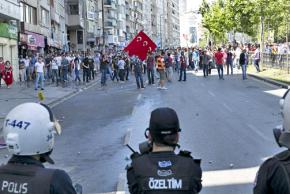The roots of Turkey’s rebellion
analyzes the issues involved in an Occupy-style revolt in Turkey.
ON FRIDAY, Turkish police surrounded protesters in Gezi Park near Taksim Square, the central square in Istanbul. Police blocked all exits and attacked them with chemical sprays and teargas.
An Occupy-style movement has taken off in Istanbul. The ostensible issue spurring the conflict is modest. Protesters started gathering in the park on May 27 to oppose its demolition as part of a redevelopment plan. But this is more than an environmental protest. It has become a lightning conductor for all the grievances accumulated against the government.
Police have waited until the early hours of each morning to attack, just as police in the U.S. did when dealing with Occupy protesters. They set fire to the tents in which protesters were sleeping and showered them with pepper spray and teargas. A student had to undergo surgery after injuries to his genitals.
The occupiers adapted and started to wear homemade gas masks. More importantly, they called for solidarity. In response to yesterday's assault, thousands of protesters turned up, including opposition politicians. But this morning's attack allowed no defense or escape. The park, and the area around it, is still closed, and still under clouds of gas.

In April, a Justice and Development Party (AKP) leader warned that the liberals who had supported them in the last decade would no longer do so. This was as good a sign as any that the repression would increase, as the neoliberal Islamist party forced through its modernization agenda.
The AKP represents a peculiar type of conservative populism. Its bedrock, enriched immensely in the last decade, is the conservative Muslim bourgeoisie that first emerged as a result of Turgut Ozal's economic policies in the 1980s. But while denying it is a religious party, it has used the politics of piety to gain a popular base and to strengthen the urban rightwing.
It has spent more than a decade in government building up its authority. The privatization process has led to accelerated inequality, accompanied by repression. But it has also attracted floods of international investment, leading to growth rates of close to 5 percent a year. This has enabled the regime to pay off the last of its International Monetary Fund (IMF) loans, so that it was even in a position to offer the IMF $5 billion to help with the Eurozone crisis in 2012.
In the meantime, the AKP has gradually consolidated its support within the state apparatus and media, and no longer needs its liberal backers. The Turkish military leadership has been compelled to accept the Islamists, having suffered a significant loss of power relative to other branches of the state such as the police and judiciary. While the erosion of the military's power should be a gain for democracy, journalists have also ended up in jail on charges of plotting coup d'etats.
Of course, there is a history of coup plotting. And the government charged 86 people with plotting to bring down the government in 2008, as part of its investigation into the Turkish "deep state". But it has been able to use this fear to conflate all opposition with anti-democratic instigation, and crush it ruthlessly. During this time, its vote has risen from 34.28 percent to 49.90 percent.
It has also demonstrated confidence in the way it has attempted to deal with the Kurdish question, and in its regional strategy. The government embarked on significant new negotiations with the Kurdish Workers Party (PKK) in 2009, partly because it wants to forge a lucrative relationship with the Kurdish regional government in Iraq.
Under the AKP, Turkey has been increasing its relative autonomy from traditional supporters in the White House and Tel Aviv, forging close relations with Iran, Hezbollah and even--until recently--President Bashar al-Assad of Syria. This has been interpreted, hysterically, as "neo-Ottomanism." It is simply an assertion of Turkey's new power.
Thus strengthened, the government is on the offensive. It has never needed the left or the labor movement, which it has repressed. It no longer needs the liberals, as its attacks on women's reproductive rights and its imposition of alcohol-free zones show.
This is the context in which a struggle over a small park in a congested city center has become an emergency for the regime, and the basis for a potential Turkish spring.
First published at the Guardian's Comment is Free website.


